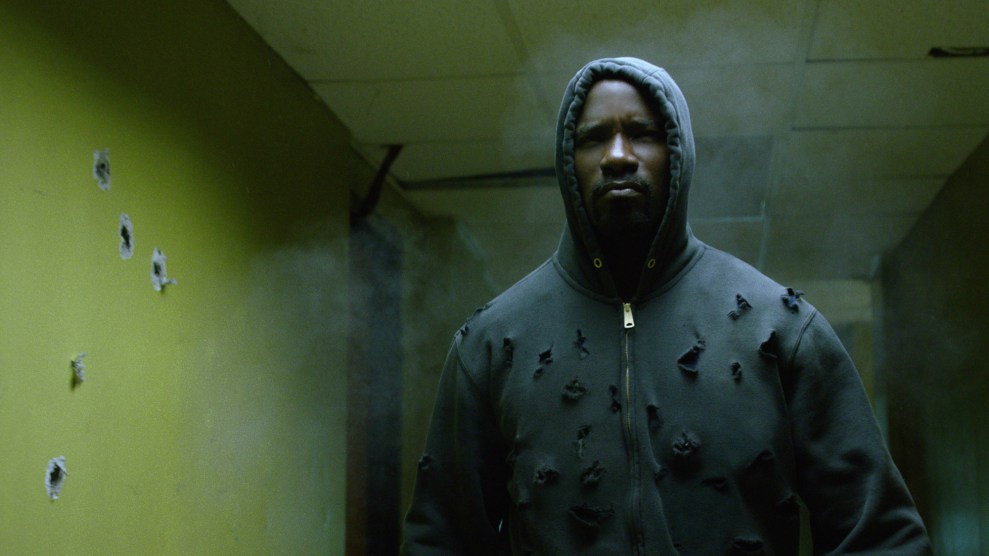Jessica Jones is the hero we need in the #MeToo era, however reluctant she may be.
Marvel’s misanthropic private eye with super strength returns to Netflix on Thursday—International Women’s Day—and the second season of Jessica Jones takes a markedly new turn. Having taken down the mind controller who kidnapped and abused her, Jessica must now confront the trauma of her past, and slowly, a conspiracy unfolds about how she came into her powers. This season grapples with feminist themes, to be sure, but they don’t pervade the show’s entire framework as they did last season, when Jessica had to confront her tormentor, Kilgrave.
Behind the scenes, though, it’s mostly women running things; season two has been heralded for “breaking barriers” by having a different female director for each of the 13 episodes. I caught up with creator/showrunner Melissa Rosenberg to talk about what it’s like when you flip the script, and what she has in store for our heroine.
Mother Jones: This season starts with Jessica trying to move on from all the bad stuff. Where are you taking her—and us?
Melissa Rosenberg: Jessica would love to ignore everything that happened in season one and she’d love to ignore her past in general, but there’s no way out but through. Present day circumstances and things that [her best friend] Trish [are] digging up force her to look into her past. The conflict is both internal and external this season, which is really rich territory for us.
MJ: Last season grappled with issues of consent, abuse, and trauma. What do you see as the major themes of this season?
MR: The major question for Jessica is, “Who am I? Am I this thing Kilgrave turned me into, which is a killer? Am I a hero? Who am I, even down to my very DNA, and what made me the way I am?” The very primal questions that are really evocative and push her into some really new territory.
MJ: This season get pretty political. There’s a side plot that delves into the #MeToo movement. How did that came together?
MR: It all happened before #MeToo. We’d written and shot all of the episodes right before that began, so it’s all very serendipitous. The characters are informed by their gender, but the gender is not driving story. I think that is so much what the #MeToo movement is about: We’re human beings, we want to be able to be who we are and be heard and seen. In that way, it fits into the movement. It sort of naturally has a feminist bent, given its creator and star are both feminists.
MJ: You told the New York Times the 2016 election shaped how this season played out. Can you talk about that?
MR: We’d be driving into the office everyday listening to NPR and hearing what the latest slam against Hillary was and feeling that resonating in our own beings. We all know what it is to be a woman striving to do something in the world, and the kind of hits that you take doing that. Hillary, of course, took more than most—more than any, I would say. So we walk into the room with those feelings being drudged up, and it informs the storytelling: the anger, the frustration, the passion of it.
MJ: In season one, Jessica works with Jeri, an attorney whose obsession with power, and selfishness, led to the death of her wife. I’m wondering whether Jeri has learned anything from that, and why she is so obsessed with power and being in control?
MR: This season we get to get just a hint about her backstory and what’s behind some of her ambition. What’s really exciting to watch this season is for all of her power and money and status, [she] can’t control everything. There’s no such thing as being invulnerable. It provides this really interesting journey for her. Watching Carrie-Anne Moss take that character on that path is like a master class in acting.
MJ: I’ve been hearing people talk about how Jessica Jones is the superhero of the #MeToo movement and Kilgrave is its villian.
MR: It was very humbling and gratifying and overwhelming that the first season contributed to that conversation. You hope you’re whole career that you can manage to contribute something positive to an issue that you’re passionate about, so this is sort of part and parcel with it all.
MJ: Is there anything that you’ve been wanting to talk about that no one’s asked you about yet?
MR: I can’t think of anything. It’s really, for me, this season has been my favorite season in terms of being able to work in a safe creative environment, where parity exists with some extraordinarily talented people. This is it for me, it’s all downhill from here!
MJ: You’re referring to the fact that all your directors are women?
MR: Yeah. That’s part of it. You’re not the only woman on set. You’re not an alien on your own set. You’re very much a part of something. I think the men felt as safe as the women do, and it’s just a really balanced environment. That sort of environment allows for everyone to really participate.












